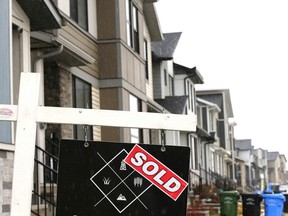Housing remains affordable, but people ‘may not be able to afford their first choice of housing type in the neighbourhood they want.’

Reviews and recommendations are unbiased and products are independently selected. Postmedia may earn an affiliate commission from purchases made through links on this page.
Article content
Many Calgarians may be feeling the burn of the city’s red-hot resale real estate market of late. The city has achieved recent all-time highs in every segment, while inventory remains at a multi-year low.
Although an ideal mix for sellers, it’s a tough pill to swallow for buyers, especially those entering the market for the first time.
“It’s not that people can’t be homeowners here,” says Doug Cabral, realtor with Royal LePage Benchmark in Calgary. “It’s that people must adjust expectations and make compromises.”
Advertisement 2
Story continues below
Article content
Based on Calgary Real Estate Board statistics from April — one of the busiest months of the year for real estate, if not the busiest — buyers remain very active, even as inventory fell 16 per cent year over year to 2,711.
That’s the lowest level for April in the last 15 years — though still well above the record-low set in 2006 when inventory was at 1,716 units.
Sales this past April were also robust.
Calgary’s market saw 2,881 sales, up more than seven per cent year over year, the third-highest level of activity since 2010.
Conditions, in turn, pushed the overall benchmark price to a new high of $603,700, an increase of nearly 10 per cent from April 2023.
New listings, 11 per cent higher than April last year, provided some relief but “did not add to supply in a material way because sales were so strong,” says Ann-Marie Lurie, chief economist with CREB.
New listings, she adds, reflect only homes that came up for sale over the course of a given month, while inventory reveals the total number of homes on the market at the end of the month.
Lurie further notes that months of supply was 0.94 in April.
Article content
Advertisement 3
Story continues below
Article content
This metric suggests that based on the pace of sales, if May had no new listings, Calgary’s inventory would be depleted before month’s end.
Another measure of market tightness, sale-to-new-listing ratio, was 83 per cent in April, denoting market conditions favouring sellers. The ratio also suggests that more than eight in 10 of April’s 3,491 new listings likely sold that same month.
Calgary’s tight market stands out among major Canadian cities, says Karen Yolevski, chief operating office of Royal LePage Real Estate Services Ltd.
“Prices in Toronto are among the highest in the country, but there is much more supply,” she said.
That’s led to easing prices, as Canadian Real Estate Association numbers from April show.
In the Greater Toronto Area, the average price was about $1.139 million, down about one per cent year over year. Yet Toronto’s sales-to-new-listing ratio was 42 per cent in April, reflecting a balance between sellers and buyers.
Conditions in Canada’s largest city are not due to a lack of demand, but rather a result of higher interest rates, which have pushed many buyers out of the market, Yolevski says.
Advertisement 4
Story continues below
Article content
Those challenges in Toronto and Vancouver have served to benefit Calgary’s market with people moving from higher priced markets to the city to purchase homes, she adds.
Yet one buyer’s advantage is another’s challenge these days in the city.
“People moving here love the value they find, but people that already live are having to adjust,” Cabral says.
Still, Calgary remains an affordable city, despite the benchmark price of a single-family detached home reaching a record of $749,000 in April, up nearly 13 per cent.
That’s because more affordable housing types are still widely available, Cabral explains, pointing to the city’s apartment segment.
In April, the benchmark price for an apartment condominium was about $346,000. Although the price increased about 18 per cent year over year, it’s a housing type first-time buyers can still afford.
“It’s not that they can’t afford homes in Calgary,” Cabral says.
“It’s that they may not be able to afford their first choice of housing type in the neighbourhood they want.”
Article content
Comments